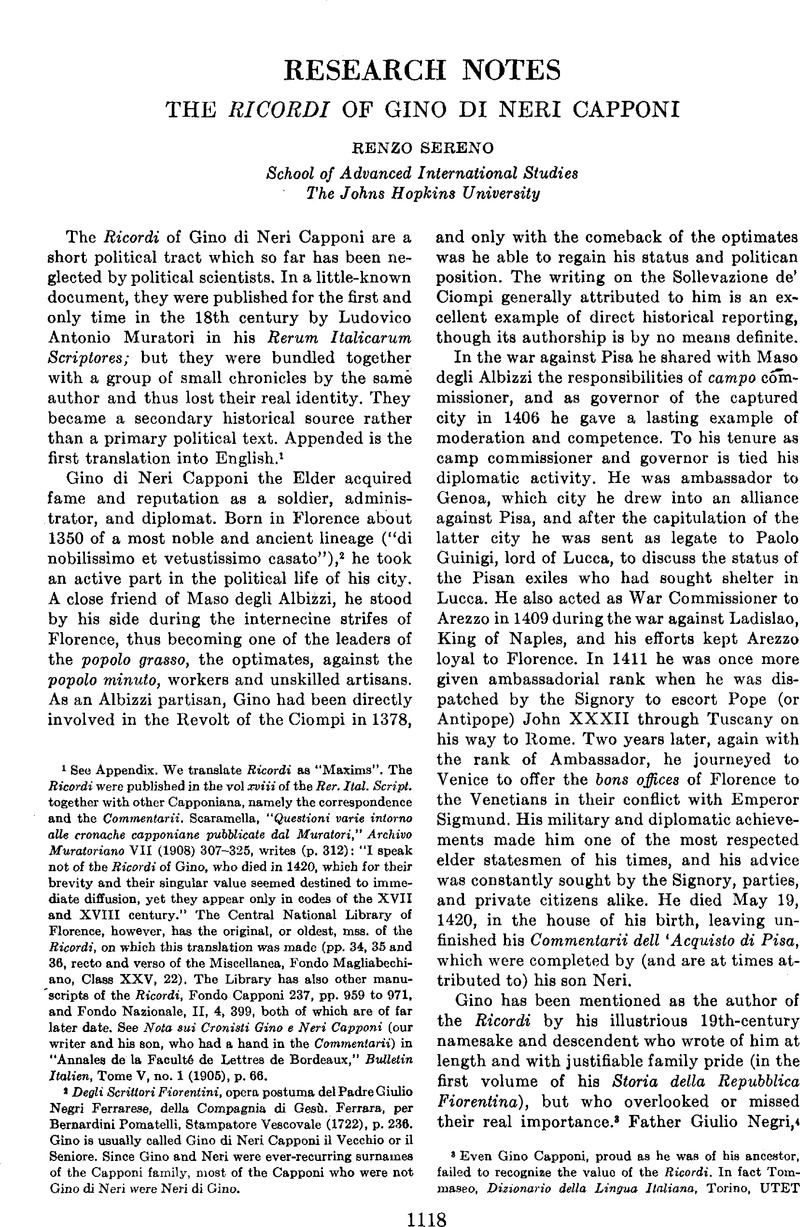No CrossRef data available.
Published online by Cambridge University Press: 02 September 2013

1 See Appendix. We translate Ricordi as “Maxims”. The Ricordi were published in the vol xviii of the Rer. Ital. Script. together with other Capponiana, namely the correspondence and the Commentarii. Scaramella, , “Questioni varie intorno alle cronache capponiane pubblicate dal Muratori,” Archivo Muratoriano VII (1908) 307–325Google Scholar, writes (p. 312): “I speak not of the Ricordi of Gino, who died in 1420, which for their brevity and their singular value seemed destined to immediate diffusion, yet they appear only in codes of the XVII and XVIII century.” The Central National Library of Florence, however, has the original, or oldest, mss. of the Ricordi, on which this translation was made (pp. 34, 35 and 36, recto and verso of the Miscellanea, Fondo Magliabechiano, Class XXV, 22). The Library has also other manuscripts of the Ricordi, Fondo Capponi 237, pp. 959 to 971, and Fondo Nazionale, II, 4, 399, both of which are of far later date. See Nota sui Cronisti Gino e Neri Capponi (our writer and his son, who had a hand in the Commentarii) in “Annales de la Faculté de Lettres de Bordeaux,” Bulletin Italien, Tome V, no. 1 (1905), p. 66Google Scholar.
2 Degli Scritiori Fiorentini, opera postuma del Padre Giulio Negri Ferrarese, della Compagnia di Gesù. Ferrara, per Bernardini Pomatelli, Stampatore Vescovale (1722), p. 236. Gino is usually called Gino di Neri Capponi il Vecchio or il Seniore. Since Gino and Neri were ever-recurring surnames of the Capponi family, most of the Capponi who were not Gino di Neri were Neri di Gino.
3 Even Gino Capponi, proud as he was of his ancestor, failed to recognize the value of the Ricordi. In fact Tommaseo, , Dizionario delta Lingua Italiana, Torino, UTET 1929, Vol. III, page 241Google Scholar, quotes the XIX century Gino Capponi's Proverbi Totcani as the proverb “vivano foggette e muoiano le berrette” (death to the hoods and long live the caps), adding that “it was in Florence the war cry of the bourgeoisie against the simple people, and the contrary was shouted a few years later.” No reference is made to the Ricordi by Tommaseo.
4 Op. cit., loc. cit. Gino di Neri il Seniore is mentioned as the writer of his own deeds in the war against Pisa, and his diplomatic skill at Genoa and his magnanimity as administrator of Pisa after the conquest are praised.
5 Alcuni Documenti su Gino Capponi il Vecchio per Ida Masetti Bencini, Rivista delle biblioteche e degli Archivi, no. 1–2, Anno xxiii, vol. xiii, Florence (January–February, 1912), pp. 120Google Scholar.
6 Guicciardini: Dialogo del Reggimento di Firenze, a di Palmarocchi, Roberto, Bari, Laterza (1932), p. 162Google Scholar. “E pero' scrisse Gino tuo bisavolo in quegli ultimi Ricordi suoi che bisognava fare de' Dieci della guerra persone che amassero piu' la Patria che l'anima perche' e' impossible regolare e' Governi e gli stati tenendoli nel modo si tengono oggi, secondo e' precetti della legge cristiana.” (“That is why your great grandfather Gino wrote in his Ricordi that the Ten of War should be men who cared more for their country than for their soul, because it is not possible in this day and age to rule domains and states according to the preoepts of the Christian law.”)
7 Romane, Morley's lecture on Guicciardini, published in Miscellanies, 4th series (Macmillan and Co., London, 1908)Google Scholar is a discourse containing a large number of quotes from Guicciardini's own pages. It revolves around the point mentioned in note 6.
8 Cf. in particular the introduction to the Discourses and the comparison of the science which Machiavelli aimed at creating with medicine and jurisprudence.
9 Guicciardini, who seldom if ever has been praised for his literary virtues (cf. de Sanctis, , Sotria della Lelteratura Italiana, Morano, Napoli, 6th printing of the stereotype edition, Vol. II, p. 94Google Scholar; and for earlier testimony, Corniani, Giambattista, I Secoli della Letteratura Italiana, Turin, Cugini Pomba, 1855, Vol. II, pp. 319–320Google Scholar, and the abundant references therein), was a favorite with Count Cavour, with Chancellor Bismarck, and with Leopold von Ranke, who admired his political acumen not only as historian but as public official. Cf. Mosca, , Storia delle Dottrine Politiche, Bari, Laterza, 1948Google Scholar, chapter on “Guicciardini e i Machiavellisti Pratici”: also Morley, op. cit., loc. cit.
Comments
No Comments have been published for this article.